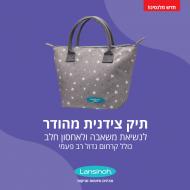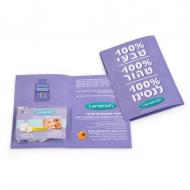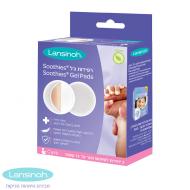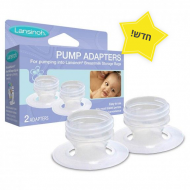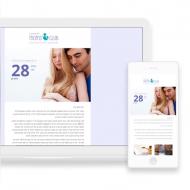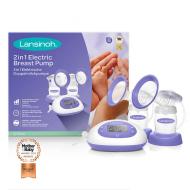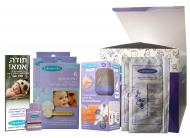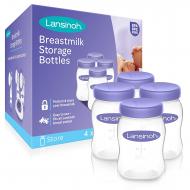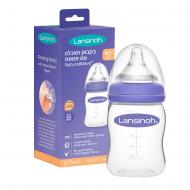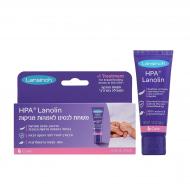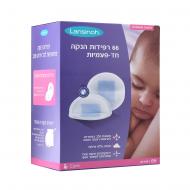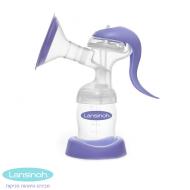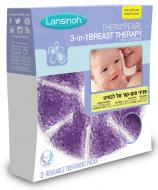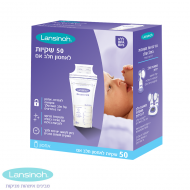למה להניק? נמנה את הסיבות
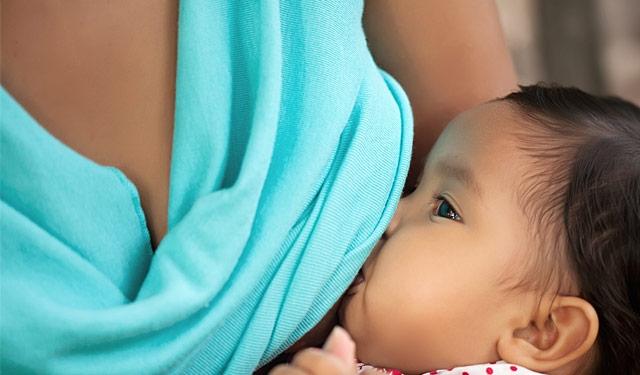
אין מחלוקת על העובדה שחלב-אם הוא המזון הטוב ביותר לתינוקות, ומעניק לאם ולתינוק יתרונות בריאותיים שלא ניתן לחקותם באופן מלאכותי. אבל אנחנו יודעים ומבינים כי הטוב ביותר אינו תמיד גם הקל ביותר, ולכן אנחנו כאן כדי לעודד אותך ולשמור על המוטיבציה שלך.
מה מרוויח התינוק?
חלב-אם הוא "מזון מושלם". הוא קל לעיכול, ומכיוון שהוא מורכב מתאים חיים, גופו של התינוק יכול לספוג אותו בקלות. חלב-אם מספק בדיוק את היחס הנכון בין מרכיבים תזונתיים חיוניים, ויטמינים, חלבונים, שומנים ונוגדנים המסייעים להתפתחות הגוף והמוח של תינוקך.
הדבר המדהים בחלב-אם הוא יכולתו להתאים את הרכבו למענה מדויק על צורכי תינוקך כשהוא גדל או כשהוא חולה. לתינוקות יונקים יש חושי טעם וריח מפותחים יותר כי חלב-אם משנה את טעמו וריחו בהתאם לתזונת האם. חשוב לא פחות, תינוקך פורח מבחינה רגשית, שכן מגע עור בעור עם האם מייצר קשר חזק ותחושת בטחון.
מכיוון שחלב-אם הוא המזון המושלם לתינוק, תינוקות יונקים נהנים משפע של יתרונות רפואיים. האקדמיה האמריקנית של רופאי הילדים American Academy of Pediatrics (AAP), סמכות מובילה בבריאות והתפתחות תינוקות, קובעת כי: "ההנקה מבטיחה לתינוק את הבריאות הטובה ביותר ואת התוצאות הטובות ביותר מבחינה התפתחותית ופסיכו-חברתית." והסיבות לכך הן:
תינוקות יונקים ...
- חולים פחות ובעלי סיכוי נמוך יותר לפתח אלרגיות.
- כנראה בעלי סיכוי נמוך יותר להשמנת-יתר וסוכרת מסוג 1 ו-2 בהמשך חייהם.
- מציגים שיעור היקרות נמוך יותר של תסמונת מוות בעריסה (SIDS - Sudden Infant Death Syndrome).
- בעלי סיכוי נמוך לפתח דלקת באוזן התיכונה (otitis media) ודלקת מעי (גסטרואנטריטיס)
- גדלים במסלול המיטבי להתפתחות מוחית
- מקבלים חומרים המסייעים בחיזוק ובפיתוח המערכת החיסונית הבלתי-בשלה שלהם באופן ששום חומר אחר אינו משיג.
- מגיבים טוב יותר לחיסונים נגד פוליו, טטנוס, דיפתריה והמופילוס אינפלואנזה (חיידק העלול לגרום לזיהום חמור).
- מקבלים חומרים התורמים להתפתחות מיטבית של הפה והלסת ומפחיתים את הסיכון לעששת.
- מוגנים מפני זיהומים במערכת הנשימה, כולל זיהומים הנגרמים מנגיפי רוטה (rotaviruses). לתינוקות יונקים יש פחות סיכוי לאשפוז עקב דלקת ריאות או ברונכוליטיס, וסיכון נמוך יותר לדלקות במערכות הנשימה התחתונות.
- נמצאו במחקרים כמשיגים ביצועים משופרים במבחני התפתחות שכלית.
- כנראה בעלי סיכון מופחת להשמנת-יתר.
מה מרוויחה האם?
אין להתעלם מן הגורם המכריע השני במשוואת ההנקה - האמא! גם אמהות מיניקות נהנות מיתרונות רפואיים, רגשיים וכספיים משמעותיים.
ההנקה...
- מפחיתה את הסיכון לסרטן השד וכנראה מפחיתה את הסיכון לסרטן השחלות והרחם.
- מפחיתה את הסיכון לפתח סוכרת סוג 2.
- אמהות מיניקות סובלות פחות מדכאון לאחר לידה. ההנקה גורמת לשחרור אוקסיטוצין ("הורמון האהבה") ופרולקטין, חומרים המסייעים בהרפיה ומפחיתים עקה (סטרס).
- שורפת קלוריות עודפות, ומקלה על הירידה במשקל אחרי הריון.
- עוזרת לרחם לשוב לגודלו הרגיל ומפחיתה דימומים אחרי הלידה.
- חוסכת זמן יקר! אין צורך לרכוש, למדוד או לערבב תמ"ל, ואין בקבוקים שצריך לחמם באמצע הלילה. חלב-אם תמיד מעורבב באופן מושלם ותמיד בטמפרטורה המתאימה. ואין שום סיכוי שתשכחי לקחת אותו אתך!
- היא חינם - לפחות החלב! גם אם את שואבת, משאבת חלב טובה ואביזרים עולים הרבה פחות מתחליף מזון לתינוקות (תמ"ל). בארצות הברית, אם ממוצעת שאיננה מיניקה מוציאה יותר מ-3,000$ בשנה על תמ"ל,..
- ידידותית לסביבה, נקיה ואינה מייצרת פסולת אריזות או זיהום.
מקורות
- (Gartner LM, Morton J, Lawrence RA, et al. Breastfeeding and the Use of Human Milk. Pediatrics 2005;115(2):496-506)
- (Gillman MW, Rifas-Shiman SL, Camargo CA, Jr., et al. Risk of overweight among adolescents who were breastfed as infants. JAMA. 2001;285(19):2461-7)(Gerstein HC. Cow’s milk exposure and type 1 diabetes mellitus. A critical overview of the clinical literature. Diabetes Care. 1994;17:13-19. Kostraba JN, Cruickshanks KJ, Lawler-Heavner J, et al. Early exposure to cow's milk and solid foods in infancy, genetic disposition, and the risk of IDDM. Diabetes. 1993;42:288-295.)
- (Gartner LM, Morton J, Lawrence RA, et al. Breastfeeding and the Use of Human Milk. Pediatrics 2005;115(2):496-506)
- (Scariati PD, Grummer-Strawn LM, Fein SB. A longtitudinal analysis of infant morbidity and the extent of breastfeeding in the United States. Pediatrics. 1997;99(6):E5.)
- (Jensen RG. Lipids in Human Milk. Lipids. 1999;34(12):1243-1271)
- (Goldman AS. The immune system of human milk: antimicrobial, anti-inflammatory and immunomodulating properties. Pediatr Infect Dis J 1993;12(8):664-672)
- (Han-Zoric, M., "Antibody responses to parenteral and oral vaccines are impaired by conventional and low protein formulas as compared to breastfeeding." Acta Paediatr Scand 1990; 79:1137-42)
- (Aaltonen AS and Tenovuo J. Association between mother-infant salivary contacts and caries resistance in children: a cohort study. Ped Dentistry 1994; 16(2):110-16. Labbok, M.H. "Does Breastfeeding Protect against Malocclusion? An Analysis of the 1981 Child Health Supplement to the National Health Interview Survey" American Journal of Preventive Medicine, 1987 )
- (Oddy, WH et al "Breast feeding and respiratory morbidity in infancy: a birth cohort study" Archives of Disease in Childhood 2003;88:224-228. Galton Bachrach et al (2003) Breastfeeding and the Risk of Hospitalization for Respiratory Disease in Infancy" Arch Pediatr Adolesc Med 157:237-243)
- (Lucas A, Morley R, Cole TJ. Randomised trial of early diet in preterm babies and later intelligence quotient. BMJ. 1998;317:1481-1487. Horwood LJ, Darlow BA, Mogridge N. Breast milk feeding and cognitive ability at 7-8 years. Arch Dis Child Fetal Neonatal Ed. 2001; 84:F23-F27. Horwood LJ, Fergusson DM. Breastfeeding and later cognitive and academic outcomes. Pediatrics. 1998;101(1).
- (Uvnas-Moberg, Eriksson: "Breastfeeding: physiological, endocrine and behavioral adaptations caused by oxytocin and local neurogenic activity in the nipple and mammary gland." Acta Paediatrica, 1996 May, 85(5):525-30)
- (Newcomb PA, Storer BE, Longnecker MP, et al. Lactation and a reduced risk of premenopausal breast cancer. N Engl J Med. 1994;330:81-87. Jernstorm, H et al "Breast-feeding and the risk of breast cancer in BRCA1 and BRCA2 mutation carriers." J Natl Cancer Inst. 2004;96:1094-1098)(Rosenblatt KA, Thomas DB. Lactation and the risk of epithelial ovarian cancer. WHO Collaborative Study of Neoplasia and Steroid contraceptives. In J Epidemiol. 1993;22:192-197)
- (Stuebe AM, MD; Rich-Edwards J, Willett W, Manson J, Michels K. Duration of Lactation and Incidence of Type 2 Diabetes. JAMA. 2005;294:2601-2610)
- (Mezzacappa ES. Breastfeeding and maternal stress response and health (Review). Nutr Rev. 2004 Jul;62(7 Pt 1):261-8)
- (Dewey KG, Heinig MJ, Nommsen LA. Maternal weight-loss patterns during prolonged lactation. Am J Clin Nutr. 1993;58:162-166)
- (Chua S, Arukumaran S, Lim I, Selamat N, Ratnam SS. Influence of breastfeeding and nipple stimulation on uterine activity. Br J Obstet Gynaecol. 1994;101:804-805)



